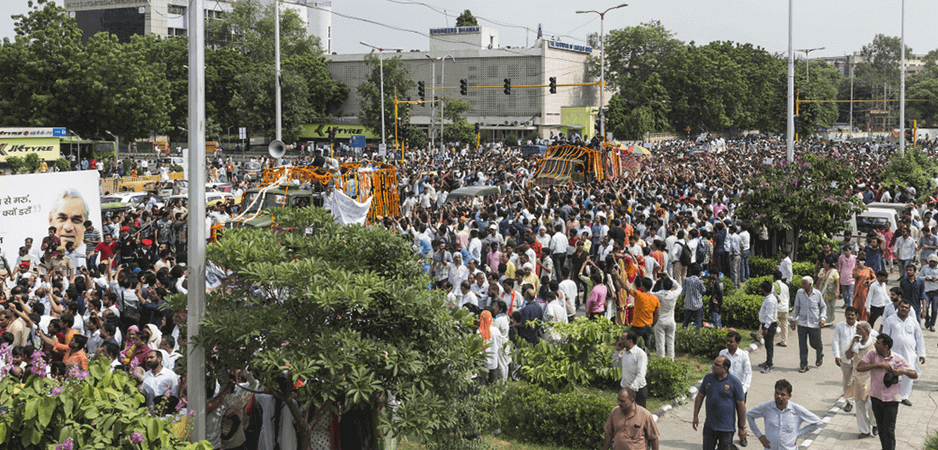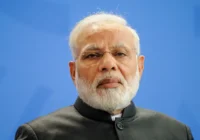The late Indian prime minister’s full term gave the BJP legitimacy, and his surprise loss at the 2004 elections created conditions for Narendra Modi to rise.
Atal Bihari Vajpayee, a three-term prime minister of India, died on August 16. Even Pranab Mukherjee, his long-term political foe, paid tribute to Vajpayee, saying “India had lost a great son and an era had come to an end.”
Vajpayee’s death has triggered an outpouring of emotion. An avalanche of obituaries has appeared that recount his charm, wit, oratory, warmth and statesmanship. Sadly, most commentary has been hagiographical.
Most people have forgotten the reason Vajpayee is most significant for independent India. Like the African National Congress, the Indian National Congress assumed power on August 15, 1947. It retained power for decades even when it declined into a dynastic fiefdom of the family of Jawaharlal Nehru, India’s first prime minister.
Eventually, the Congress party lost power after Indira Gandhi locked up her opponents, muzzled the press and damaged democracy. When that happened in 1977, a former Congress member took the helm. Before Vajpayee first took charge in 1996, the big boss of every single non-Congress government was a former party member.
In contrast, Vajpayee began his career in the Bharatiya Jan Sangh, the predecessor of the current ruling Bharatiya Janata Party (BJP). When Vajpayee kicked off his career in the early 1950s, Nehru was at his best. These were times when the first Indian prime minister was dazzling both the masses at home and audiences abroad.
Like Nehru, Vajpayee was a Brahmin, a Hindu caste. Unlike Nehru, Vajpayee was a poor Hindi-speaking Brahmin, not a rich English-spouting one with cadences polished at Harrow. While Nehru’s writings and speeches are almost exclusively in English, Vajpayee was the finest Hindi orator in Indian politics for decades who managed to make his name as a fine poet as well.
Like Nehru, Vajpayee’s time in office was historic. He conducted nuclear tests, formally declaring India as a nuclear power. He rolled back the inefficient and asphyxiating Indian state, boosting economic growth to over 8%. He invested in infrastructure, launching the Golden Quadrilateral highway network project to connect major industrial, agricultural and cultural centers of India. To his credit, Vajpayee also launched a national literacy mission to reduce India’s infamous illiteracy.
Not all went hunky dory for this legendary orator though. He suffered the ignominy of releasing hostages to the Taliban when a plane was hijacked from India and taken to Kandahar in Afghanistan. The border conflict over Kargil cost many Indian lives as Vajpayee’s government recovered territory taken over by Pakistan.
Yet Vajpayee lasted a full term in office, becoming the first non-Congress prime minister to do so. Even the historic 1977 government had lasted merely three years before collapsing due to ideological differences and petty personal squabbles. Most people regarded Vajpayee as a decent prime minister with a strong cabinet, and many were surprised when his BJP government lost power in the 2004 election.
It turned out that the key reason Vajpayee lost was because voter participation by the middle classes, the BJP’s historic base, fell significantly. It is a fear that haunts the BJP even today as it prepares for the 2019 election.
VAJPAYEE’S LOSS LED TO RISE OF MODI
When the Congress party returned to power in 2004, it was nominally led by Manmohan Singh. The real power behind the throne was wielded by Sonia Gandhi, the Italian-born daughter-in-law of Indira Gandhi who was now the matriarch of the Nehru family. Her loyalists were ferociously opposed to the policies of the Vajpayee government. Arjun Singh, a key vassal of the Nehru family, went so far as to argue for a “detoxification” of the administration.
Joined a prayer meeting for Atal Ji in Delhi this evening. Here is my speech. https://t.co/CQmGXAw1DE pic.twitter.com/2NKB1FHo2E
— Narendra Modi (@narendramodi) August 20, 2018
Even though the Congress-led government enjoyed the fruits of Vajpayee’s policies in the form of strong economic growth, it proceeded to dismantle the orator’s legacy swiftly and surgically. The Nehru loyalists increased government expenditure through populist handouts, gave fresh powers to India’s famously corrupt bureaucrats, and created a bad-loan crisis by directing banks to lend money to cronies. Corruption reached astronomical levels and a famous headline in India Today, “nine years, nine scams,” deservedly stuck.
Not content with dismantling Vajpayee’s legacy, the Congress-led government treated him like an untouchable. He was deemed to be a “mukhauta,” the Hindi word of mask for hardline elements of his party.
To be fair, Nehru loyalists confined Narasimha Rao, a Congress prime minister who liberalized the economy in 1991, into the dustbin of history too. Their overriding goal was to create a mythology around the Nehru family and prepare the path for Rahul Gandhi to take over the family throne.
This triggered a reaction within the BJP. After all, Vajpayee has been a member of parliament for decades. He was friends with many of the denizens of Lutyens’ Delhi, as the ruling elite of India who live in palatial colonial buildings are popularly known. In light of the strength of his relationships, hardliners in the BJP accused Vajpayee of pandering to the Lutyens’ cabal.
Yet the BJP stalwart’s friendship with the Lutyens’ cabal proved fickle and, once he lost power, Vajpayee was treated as a mere Hindi-speaking upstart. Lutyens’ Delhi painted the poet as a feckless tool of the Rastriya Swayamsevak Sangh (RSS), the parent organization of the BJP. The RSS decided it was time for a true blue ideologue’s ascension who was resolutely opposed to the Lutyens cabal, paving the path for Prime Minister Narendra Modi.
It is important to remember that Modi was a pariah, nationally and internationally, after the Gujarat riots of 2002. If Vajpayee had not been in power then, Modi would have most certainly have been dismissed from office that year. For decades, the Congress had stymied the growth of opposition parties in India’s numerous states by dismissing their governments, using Article 356 of the Constitution of India. A Congress-led government would have most certainly relieved Modi of his duties in 2002. Having a BJP government in Delhi proved to be Modi’s life insurance.
Yet the loss of the BJP in the national elections of 2004 worked in Modi’s favor. Even as his party lost control of the country, the Gujarat strongman retained control of his state. There was also an interpersonal equation that worked in his favor. Reportedly, Vajpayee was not terribly fond of Modi. Therefore, many analysts surmise that Modi would not have gone very far in a Vajpayee-led BJP. With the poet statesman out of the way, Modi had more room to grow.
More importantly, Vajpayee’s loss led the RSS to conclude that centrist politics did not pay and the BJP had to move further to the right. Also, out went the age of amiable statesmanship, in came the era of street-smart guile.
It was now time to replace a Brahmin poet with a subaltern trader, a consensus builder with a populist strongman and a bon vivant with a stern puritan. It was time for Vajpayee’s political demise and the rise of Modi.
The views expressed in this article are the author’s own and do not necessarily reflect Fair Observer’s editorial policy.
Support Fair Observer
We rely on your support for our independence, diversity and quality.
For more than 10 years, Fair Observer has been free, fair and independent. No billionaire owns us, no advertisers control us. We are a reader-supported nonprofit. Unlike many other publications, we keep our content free for readers regardless of where they live or whether they can afford to pay. We have no paywalls and no ads.
In the post-truth era of fake news, echo chambers and filter bubbles, we publish a plurality of perspectives from around the world. Anyone can publish with us, but everyone goes through a rigorous editorial process. So, you get fact-checked, well-reasoned content instead of noise.
We publish 2,500+ voices from 90+ countries. We also conduct education and training programs
on subjects ranging from digital media and journalism to writing and critical thinking. This
doesn’t come cheap. Servers, editors, trainers and web developers cost
money.
Please consider supporting us on a regular basis as a recurring donor or a
sustaining member.
Will you support FO’s journalism?
We rely on your support for our independence, diversity and quality.






